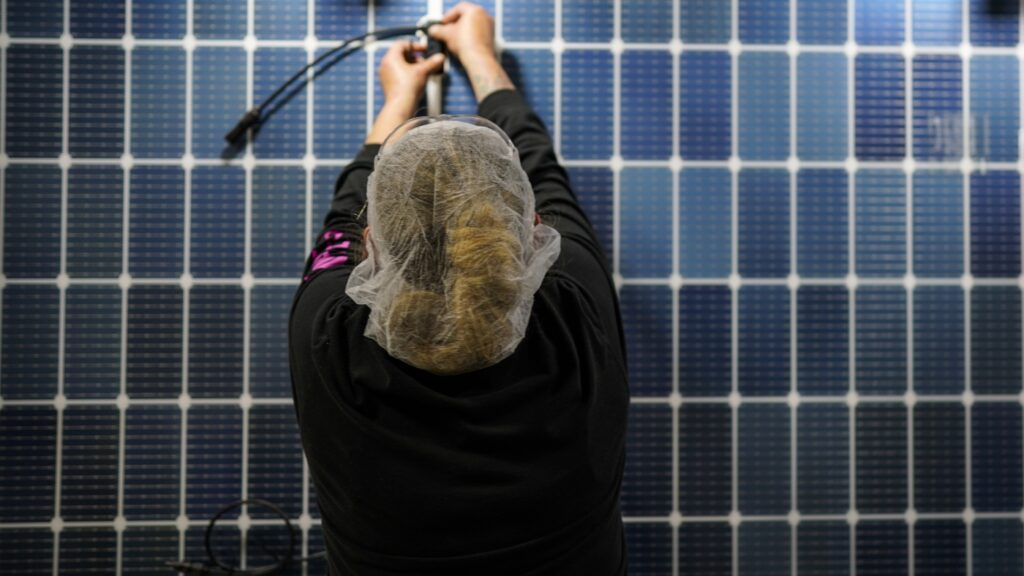
An employee works on a solar panel inside the Hanwha Qcells Solar plant, Monday, Oct. 16, 2023, in Dalton, Ga. The Korean company is opening what it says is the first solar panel factory to begin production in the U.S. since the passage of President Joe Biden’s signature climate legislation. (AP Photo/Mike Stewart)
WASHINGTON, D.C. – The future of American solar manufacturing hangs in the balance as proposed cuts to tax credits threaten to derail the burgeoning industry. Advocates warn that without these incentives, the sector could face significant setbacks.
Immediate Impact
In recent years, solar manufacturing in the United States has experienced unprecedented growth. This boom was largely fueled by tax incentives introduced under the Inflation Reduction Act, signed by President Joe Biden. According to the Solar Energy Industries Association (SEIA), tens of billions of dollars have been invested in solar factories across the nation, potentially creating up to 60,000 manufacturing jobs.
60,000 jobs could be created by new solar manufacturing facilities.
Key Details Emerge
However, the sector’s momentum is now at risk. Congressional Republicans are considering rolling back these clean-energy tax credits as part of a comprehensive tax-and-spending bill. This move could undermine efforts to promote American-made solar products and challenge China’s dominance in the industry.
Industry Response
Mick McDaniel, general manager of Bila Solar in Indianapolis, expressed concern over the potential impact of these changes. “What I see two years out is low-cost will once again drive demand in this market,” he noted, highlighting the challenges faced by U.S. manufacturers with higher production costs compared to overseas competitors.
By the Numbers
$9.1 billion invested in operational U.S. solar factories.
$36.7 billion invested in facilities under construction or development.
Background Context
This development builds on a series of efforts by past administrations to bolster domestic solar manufacturing. President Trump, during his first term, imposed tariffs on imported solar products to protect U.S. manufacturers. Despite these measures, the Inflation Reduction Act’s incentives were seen as a critical catalyst for the industry’s growth.
Expert Analysis
Doug Lewin, an energy consultant in Texas, emphasized the importance of tax credits for maintaining the competitiveness of American solar products. “If the tax credits disappear too soon, companies will opt for cheaper foreign panels,” he warned, potentially leaving U.S. manufacturers stranded.
What Comes Next
The timing is particularly significant because the Senate Finance Committee has proposed phasing out these tax credits starting next year. Under current law, these incentives are scheduled to phase out by 2032 or when greenhouse gas emissions reach a specific target, whichever comes later.
Industry executives and analysts argue that a premature rollback could hinder the U.S. solar market’s ability to scale operations and compete globally. Scott Moskowitz of Qcells highlighted the need for a stable policy environment to ensure the continued growth of domestic manufacturing capabilities.
Regional Implications
The broader impact of these potential changes could extend beyond the solar industry. A study by the Clean Energy Buyers Association suggests that without tax credits, the U.S. would build fewer clean-energy projects, increasing reliance on natural gas and raising electricity costs for consumers.
Timeline of Events
2018: Trump imposes tariffs on imported solar products.
2022: Biden signs the Inflation Reduction Act into law.
2023: Proposed rollback of tax credits by Senate Finance Committee.
Future Implications
As Congress faces pressure to finalize the tax-and-spending bill by July 4, solar manufacturers and supporters are racing against time to influence lawmakers. The decision will have lasting effects on the U.S. solar market’s trajectory and its ability to compete with global players like China.
Heather Reams, president of Citizens for Responsible Energy Solutions, voiced concerns about the potential consequences of limiting renewable energy development. “You’re looking at the lights going out and the air conditioning going off in the hot summer,” she warned, underscoring the need for a balanced approach to energy policy.







